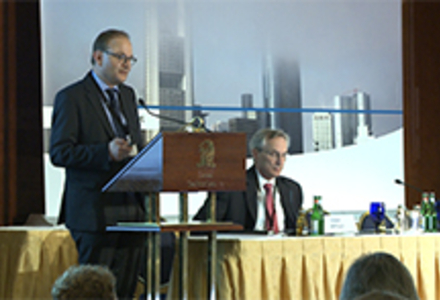Public Finance Workshop
The MCC brought together international top-researchers in a Public Finance Workshop. You can find the documentation of the presentations here.

[Translate to EN:] Ottmar Edenhofer beim Workshop Foto: RGKP
Participants included MCC director Ottmar Edenhofer as well as Gilbert Metcalf from Tufts University and Lawrence H. Goulder from Stanford University. Furthermore, Martin Weitzman from Harvard University also held a presentation.
In recent years, a significant body of work has emerged in climate economics that investigates rationales for carbon pricing beyond that of Pigouvian taxation, considering the merits of carbon pricing relative to other fiscal options as a means for, e.g., financing public debt and public spending, or enhancing dynamic macroeconomic efficiency. The aim of the workshop is it not only to advance the academic discussion, but support the exploration of the relevance of this research for policymakers seeking policy options that allow reconciling management of long-term climate risks with short term concerns over economic growth, competitiveness, and other politically relevant factors.
In this video you will see who of the well-respected scientists discussed the specific examples of carbon pricing in Europe, Australia and China. Here you can learn which states could how much reduce their debt, what could be taken from mistakes in the past - and how the challenge of international cooperation could be overcome.
Here you will find additional 5 video interviews with
Ottmar Edenhofer
Martin Weitzman
Gilbert E. Metcalf
Lawrence Goulder
Jan Siegmeier.
Furtheremore, you will find here several videos of all the orginial talks held at the first day of the Public Finance Workshop. You can also download the presentations.
Also, you will find here in several videos all the orginial talks held at the second day of the Public Finance Workshop. Again you can download the presentations.
The presentations of the workshop:
Day One
Session 1
Lawrence H. Goulder: Climate Change Policy's Interaction with the Tax System
Michael Jakob: Closing the emission price gap
Session 2
Sebastian Rausch: Fiscal Consolidation and Climate Policy – An Overlapping Generations Perspective
Session 3
Antonio M. Bento: Ricardian rents, environmental policy and the ”double-dividend” hypothesis – paper
Session 4
Alex Schmitt: Optimal Carbon and Income Taxation
Session 5
Gilbert E. Metcalf: Using the Tax System to Address Competition Issues with a Carbon Tax
Armon Rezai, Larry Karp: The political economy of environmental policy with overlapping generations
Day Two
Session 6
Warwick J. McKibbin, Adele Morris, Peter Wilcoxen: Carbon Price Consultations
Session 7
CAO Jing: China's Carbon Pricing – Status and Prospect
Kathryn Harrison: The Political Economy of British Columbia's Carbon Tax
Warwick J. McKibbin: Australia's Carbon Tax Experience
Ian Parry: Fiscal Policy to Mitigate Climate Change





